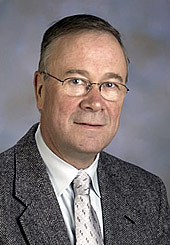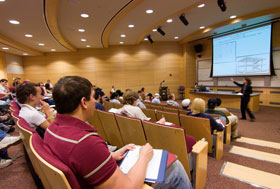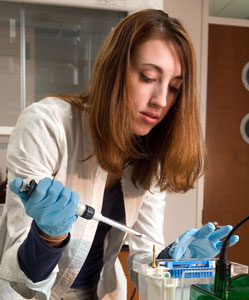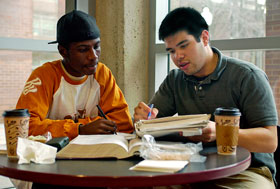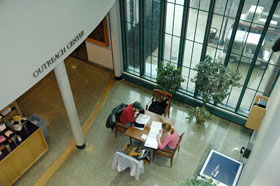  |
| HOME | THIS ISSUE | CALENDAR | GRANTS | BACK ISSUES | < BACK | NEXT > |
From the ProvostAmbitious academic agenda to complement UConn's physical transformation- September 5, 2006 |
||||||||||||
The transforming effects of the UConn building program were recently addressed in a Hartford Courant op-ed piece by Bruce Stave, a distinguished UConn professor emeritus of history. He compares these contemporary changes to those stimulated by the construction programs of the late 1930s, which spurred UConn's development into a modern university. That crucial metamorphosis would not have occurred if the UConn community of the 1930s did not seize the opportunities presented by those buildings. Today, we confront a similar opportunity provided by the enormous investment of the State of Connecticut in our buildings and infrastructure. But buildings are empty shells if we do not put them to work to serve our academic aspirations. In the words of Thoreau, "things do not change; we change;" and we must use the changes in our "things" - our greatly improved physical environment - to change ourselves, in order to live up to the great faith in this University demonstrated by the people of Connecticut. Restructuring We now have a different mode of operation for a sizeable component of the University's academic sector: Human Development and Family Studies, Allied Health, and Physical Therapy are now embedded in three of our most successful research schools (the College of Liberal Arts and Sciences, the College of Agriculture and Natural Resources, and the Neag School of Education). In addition, Continuing Studies is firmly re-aligned within the academic structure, responsive to the outreach needs of the schools and colleges and much better placed to offer programming of academic distinction to our non-traditional clientele.
Academic leadership While such changes may initially appear destabilizing, they do present an opportunity to work to achieve our academic goals. We need to think carefully about the kind of leader each school needs, and the ways new leadership can work toward meeting the academic goals of the whole University, as well as the goals within a particular school. The search committees are broadly representative of faculty, staff, students, alumni, and friends, but we also welcome your engagement in the searches by offering ideas on the qualities and accomplishments desired in a dean, by nominating professional colleagues for these leadership opportunities, and by participating in the interview and evaluation process. The Academic Plan The plan will enable us to chart a course for the institution by directing our research and teaching priorities, forming the basis for our development activities, and informing our plans for the $1 billion remaining in 21st Century UConn. Again, the active participation of all members of the academic community is crucial. Express your views; read and critique documents; define your own role in the successful implementation of the plan; and, above all, think originally and innovatively. If we just do more of the same, we will barely keep up with the pack, never mind achieve the greatness for which we strive. Undergraduate education: learning
We are well along in our planning and have begun implementation, including several major initiatives that will allow us to compete successfully with the best institutions in the land for quality of the undergraduate experience. The first goal of undergraduate education is an individualized learning experience for each student arising from our many enrichment opportunities as a research institution: undergraduate research, study abroad, honors, internships, service learning, and more. Our second goal is to improve learning by promoting good teaching and the assessment of learning: the Provost's Task Force on Teaching, Learning, and Assessment, a panel of faculty experts, will report in February. Our third undergraduate goal is learning about the world in order to develop global citizens: a faculty task force recently completed an excellent report (see the Provost's website) that addresses recruitment and retention of international undergraduates, curricular pathways, study abroad, and a global living-learning community. Other strategic initiatives this year are the development of living and learning communities and a sophomore year learning experience. In all these efforts, Vice Provost Veronica Makowsky needs the active participation of as many faculty as possible. Please contact her if you have ideas about improving the undergraduate experience or would like to work on one of the initiatives mentioned. Research: discovery Every college and school has been engaged in a strategic planning process that will identify areas of strength and importance across the University. Our next task is to synthesize and expand these unit-based plans into a university-wide plan that is not silo-driven, but is truly synergistic and interdisciplinary. Four criteria will drive the research plan: focus, strength, potential, and relevance:
We must focus attention on areas where we already exhibit great strength, where this strength has the potential to be nurtured into national and international prominence, and where development of the area is of relevance to the state, the region, and the nation. A few examples are: Human stem cell work , an area that builds upon very substantial research strength both at the Storrs campus and at the Health Center, including well developed programs in animal stem cells and the recently established Human Embryonic Stem Cell Facility. The state has recognized the relevance and potential of stem cell research in Connecticut with the investment of $100 million over the next 10 years. A second example is human rights, where our research and curriculum are not only unparalleled, but unique. We have two named chairs, an outstanding research collection of human rights materials housed in our Dodd Center, and a human rights minor for undergraduates that includes the individualized experiential learning of internships. In addition, during the past two years, human rights has been an area where our students have become increasingly engaged outside the classroom as well as within it. A third example is fuel cell technology. The Connecticut Global Fuel Cell Center is an established, focused, and nationally renowned program located in our School of Engineering, with a world-class faculty and associated teaching programs in chemical engineering and materials science. The potential here is great since it is one of the few areas in which research opportunities and funding are projected to grow as the country wrestles with the scarcity of fossil fuel. Its potential and relevance are further confirmed by the availability of extensive federal funding and its identification by the Battelle Corp. in a recent study of the core competencies required to sustain the Connecticut economy. A fourth example arises from the University's plan to establish a Center for Entrepreneurship as a joint project between the School of Business and the School of Law. Funded by significant new state dollars, this program builds upon significant strengths in both schools in order to build a support structure for entrepreneurial business activity that will benefit the state in addressing economic development and workforce issues. The Neag School of Education has received the prestigious Teachers for a New Era grant from the Carnegie Corp. in recognition of its outstanding reputation in teacher education. This initiative encourages and supports significant collaboration between the College of Liberal Arts and Sciences and the Neag School of Education to address significant national issues with teacher education as they are manifested in pupil learning. A final example is the arts and humanities. A university cannot achieve greatness or claim to provide an education without them. Through interdisciplinary endeavors like the Humanities Institute, faculty, graduate students, and undergraduates explore and contribute to what it means to be human and have a culture or cultures. Cultural enrichment provides a focus for a meaningful life, and its strength, potential, and relevance are immeasurable for the individual, the state, and the nation. This is not intended to be an exhaustive list. I intend to work with the Council of Deans, using the various college and school strategic plans, to draft a research plan that will provide the basis for discussions across campus. I urge your active participation. The academic environment: support
I have outlined a far-reaching and ambitious agenda for the University. We have the opportunity to define, strengthen, and advance our academic purposes in a major way. We have the buildings, we have the infrastructure, we have an improved academic structure, we have a student body that is more talented than at any time in our history, we have a state that supports higher education, and we have the opportunity to recruit talented academic leaders from among the best in the nation. This is an exciting time indeed. I look forward to working with all of you as we continue to build our great University and make things change by changing ourselves.
|
| ADVANCE HOME UCONN HOME |

